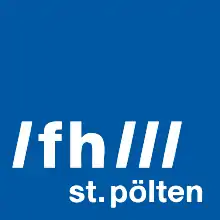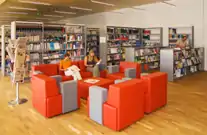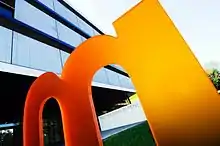St. Pölten University of Applied Sciences
The St. Pölten University of Applied Sciences (German: Fachhochschule St. Pölten) is a provider of higher education with departments for Rail Technology and Mobility, Health Sciences, Computer Science and Security, Digital Business and Innovation, Media and Digital Technologies, and Social Sciences. The combination of subject areas in teaching and research creates room for interdisciplinary scientific findings, products and solutions for the industry and society. Approximately 3,400 students are currently acquiring a practice-oriented academic education in various study programmes and further education programmes.
 | |
| Established | 1993 |
|---|---|
Administrative staff | Executive Board: Gernot Kohl, Johann Haag, Hannes Raffaseder Staff Members: 353 full-time staff members (administrators and instructors) approximately 842 part-time instructors (as of 2019) |
| Students | 3.421 (as of 2019) |
| Location | Sankt Poelten / Capital of Lower Austria , Austria |
| Website | http://www.fhstp.ac.at/en |
History

The History of the UAS St. Pölten began in 1993, when the „Verein zur Föderung der Gesellschaft zur Durchführung von Fachhochschul-Studiengängen St. Pölten m.b.H.“ (eng.: Association for the Advancement of the Society for the Implementation of the University of Applied Sciences St. Pölten ltd.) was founded. In the academic year 1996/97 with Telecommunication and Media the first degree programme started. In 2004 the facility was awarded the legal designation 'University of Applied Sciences'. In 2007 the St. Pölten UAS moved to the building in the Matthias Corvinus-Straße. The new campus was officially opened in the presence of Federal President Dr. Heinz Fischer. At the moment the educational offer covers 13 bachelor‘s and 13 master‘s degree programmes as well as 24 further Education Courses.
Study Programmes

Bachelor's degree programmes[1]
- Management & Digital Business
- Marketing & Communication
- Creative Computing
- Media Technology
- Smart Engineering of Production Technologies and Processes
- Media Management
- Data Science and Business Analytics
- IT Security
- Rail Technology and Mobility
- Dietetics
- Healthcare and Nursing
- Physiotherapy
- Social Work
Master's degree programmes[2]
- Digital Marketing & Communication
- Digital Media Management
- Economic and Financial Communications
- Digital Design
- Digital Healthcare
- Digital Media Production
- Interactive Technologies
- Applied Research and Innovation in Computer Science
- Cyber Security and Resilience
- Information Security
- Data Intelligence
- Rail Technology and Management of Railway Systems
- Social Work
Further Educational Courses
The spectrum of further education programmes is continuously expanded. Most of these are offered on a part-time basis.
Research
The St. Pölten UAS conducts research in the following institutes and fields of competence:
- Media Technology / IC\M/T – Institute of Creative\Media/Technologies: The media focus at the IC\M/T consists of the research groups for Video Production, Audio Design, Media Computing, and Mobile. The institute conducts research in the focus areas creative content & digital heritage, infotainment & edutainment, and smart tools & digital workflows.
- Media Economics / Institute of Media Economics: Research topics include media systems in transition, new organisational forms and business models, and effects and use of media.
- IT Security / Institute of IT Security Research: The research focuses on privacy, biometrics, IT forensics, industrial security, anti-forensics, security management, and software security.
- Health Sciences / Institute of Health Sciences: Topics range from nutrition and exercise in health promotion, disease prevention, therapy and rehabilitation to quality assurance with special consideration for the subject areas of geriatric nutrition, consulting techniques, posture – exercise – locomotion, and health services research as well as interdisciplinary and multidisciplinary topics.
- Social Sciences / Ilse Arlt Institute for Social Inclusion Research: The institute conducts research in the fields of social diagnostics, social space analysis, client participation, diversity, senior citizens and their relatives, general questions of inclusion, and use of new media.
- Rail Technology & Mobility / Carl Ritter von Ghega Institute for Integrated Mobility Research: The institute engages in application-oriented research and development with transport and mobility as focus areas.
- Josef Ressel Center Center for Unified Threat Intelligence on Targeted Attacks (TARGET): The purpose is to explore and enhance IT security in case of targeted attacks against companies.
- Health Sciences, Social Sciences, Digitalisation / Center for Digital Health Innovation: Topic areas are information and communication technology in the healthcare sector with a focus on active assisted living and motor rehabilitation.
UAS Board
In the UAS Board election of 2020, Alois Frotschnig was elected as Chairperson of the Board and Susanne Roiser as Deputy Chairperson for a term of three years.
Campus
In the winter semester 2007/08, the St. Pölten University of Applied Sciences moved into its 14,300-square metre building which was newly completed at the time.
Infrastructure:
- Five lecture halls with room for up to 215 people
- 24 seminar rooms
- Ten multimedia labs
- Seven computer rooms
- An assembly hall for up to 500 people
- A canteen that seats approximately 170
- 225 parking spaces
- A library with roughly 50,000 items
Since 2013, the UAS has rented additional rooms in the nearby Business & Innovation Centre (BIZ). It also maintains further UAS locations in Heinrich Schneidmadl-Straße, Herzogenburger Straße and Wiener Straße. In 2021, the main building will be extended by another directly adjoining new building to form the Campus St. Pölten.
The library of the St. Pölten UAS has a collection of about 50,000 media and has also been hosting a branch of the city library of St. Pölten since 2013.
The St. Pölten UAS maintains a number of service units to support its students in organisational matters. The campus sports club offers a wide range of courses that can be found here.
It takes only about 10-15 minutes to walk from the Campus St. Pölten to the city’s main train station. Student residences can be found in close proximity of the UAS. Two natural bathing lakes are within walking distance as well. Further information on housing and leisure activities in St. Pölten is available here
Campus Media
Campus Radio 94.4
The free radio station also serves as the educational radio of the St. Pölten UAS and is the only terrestrial student broadcaster in Austria. All aspects of everyday radio life are managed exclusively by students. The fields of activity include everything from moderation and programme design, technology and audio production to marketing and event organisation.
Magazine SUMO
The educational magazine of the St. Pölten is published both in print and online. It gives students the opportunity to get involved in the development of a magazine from scratch. The product range of SUMO – a training/junior company supervised by the bachelor degree programme Media Management – consists of the print magazine issued two times a year (with a circulation of 3,000 copies) and the online magazine SUMOmag.at. Both types of media address topics from the worlds of media and communications.
c-tv – TV Research Lab
c-tv produces reports on current topics, short films and pilots. It also serves as an experimental lab for new TV formats and experiments with the television medium. All contributions are produced by students of the St. Pölten UAS. Under the guidance of experienced lecturers, the students become familiar with all processes involved in the development, production and presentation of a TV broadcast, and carry them out independently.
fhSPACEtv
fhSPACEtv is an interdisciplinary initiative launched by the Media Technology and Digital Media Technologies programmes at the Institute of Creative\Media/Technologies under the direction of Prof. Markus Wintersberger, Christian Müller and Thomas Wagensommerer. The aim of this collaboration is to bundle creative and artistic potential within the university’s departments and to integrate specific approaches and requirements for digital media by pooling contemporary and alternative information channels and forms of presentation for students.
International Affairs
The St. Pölten UAS maintains relationships with approximately 150 partner universities in 30 countries.
The international coordinators maintain professional contact with partner universities of their focus areas in research and teaching. They consult incoming and outgoing student in subject-related matters, in particular in course selection. The international coordinators work in close collaboration with the Office for International Relations, which offers organisational and administrative support.
Prizes, Certificates and Distinctions (a Selection)
- 1st place in Solar Decathlon 2013 (as part of the consortium Team Austria)(Solar Decathlon)
- German Library Index (BIX)(categories “efficiency” and “use”)
- “Bibliotheken Award“ (library award) of the province of Lower Austria (category “innovations in library management“)
- Diploma Supplement Label
- Distinction of the Career Service in the Universum Survey 2016
- Excellent ratings for the alumni work of the St. Pölten UAS in the Alumniscore 2016
- Top marks for the bachelor degree programme IT Security in the CHE Ranking (categories “study situation”, “mentoring by lecturers”, “completion of studies within reasonable time period”)
- Distinction as best place to work in the sector “education and research” 2020 (Top Arbeitgeber: Branchenbeste im Bildungsbereich)
Sources
- "Bachelor Studies". St. Pölten University of Applied Sciences.
- "Master Studies". St. Pölten University of Applied Sciences.
External links
- Homepage of the Sankt Poelten University of Applied Sciences (in German and English)
- Campus Radio 94.4 (in German)
- SUMO educational magazine (in German)
- Institute for Media Informatics (in German)
- Ilse Arlt Institute for Social Inclusion Research (in German)